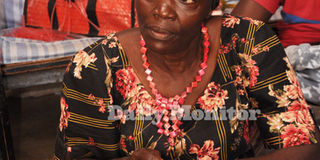Women in Business: Closing gender gaps

A woman ties a roll of woven straws. Women are less likely than men to be hired in paid jobs due to direct and indirect discrimination. PHOTO BY RACHEL MABALA
What you need to know:
- Gender inequality is costing sub-Saharan Africa about $95b. Gideon Badagawa explains how this is holding back the continent and what can be done to stop it.
- The financial sector remains underdeveloped and only 28 per cent of the adult population in Uganda has access to formal financial services.
Women contribute 52.2 per cent of the labor force in Uganda and are an important pool of potential talent to help Uganda meet its development goals especially in entrepreneurship and Micro, Small & Medium Enterprises (MSME) growth. Women face more challenges than men in starting, managing and growing their enterprises as they are more likely to be impeded by lack of necessary capacities, skills and resources. They are more disadvantaged than men due to legal impediments, established cultural norms and attitudes about women’s role, less mobility and the unequal demands of domestic responsibilities on women’s time.
The African Human Development Report 2016 indicates that in Sub Saharan Africa, the average unadjusted gender pay gap is estimated at 30 per cent. Thus for every dollar earned by men, a woman earns 70 per cent. The estimated total annual economic losses due to gender gaps in labour market average $95 billion per year since 2010 in Sub-Saharan Africa and could be as high as $105 billion (2014), that it 6 per cent of Gross Domestic Product (GDP).
Regulatory environment
Uganda’s regulatory policies have been supportive to developing women in business through mainstreaming gender in the available policies;
Labour laws are ‘gender-neutral’ and mainly concerned with establishing a safe and good working environment for employees in the formal sector. In practice, women are less likely than men to be hired in paid jobs due to direct and indirect discrimination.
Women can register a business without the legal requirement to obtain their husband’s permission. The Registration of Companies Act (2012) simplified the registration process but many women entrepreneurs are not aware of the registration processes. Yet business registration and licensing is an important conduit to creating a thriving and robust business sector. It enables businesses, particularly small ones, to gain access to funding and to certain protections by the law. It also helps formalise the economy as registered businesses pay tax and deliver other important benefits to the economy, like job creation.
Statutory property and inheritance laws accord the same property rights to both females and males, however, cultural and customary practices discriminate against women and girls in the ownership and inheritance of land and they have limited recourse to protect their legal rights. Customary law is still recognised as a valid source of law under the constitution.
Policy commitments
The National Development Plan, the National Export Strategy, the MSME Policy and The ‘Buy Uganda Build Uganda’ recognise the economic empowerment of women as a critical priority and set goals for improving women’s access to property, skills, capacities and resources so they may participate equally in generating economic wealth for the country.
Access to finance
The financial sector remains underdeveloped and only 28 per cent of the adult population in Uganda has access to formal financial services. Despite the efforts being made by some banks; Centenary Bank with a SupaWoman financial literacy programme, dfcu Women in Business and efforts by Finance Trust and a few others, banks and Savings and Credit Cooperatives (SACCOs) are not making significant efforts to reach out to the women’s market. Women-owned businesses that access loans do so mainly through group loan mechanisms. This is limiting and does not respond to the needs of all women entrepreneurs.




